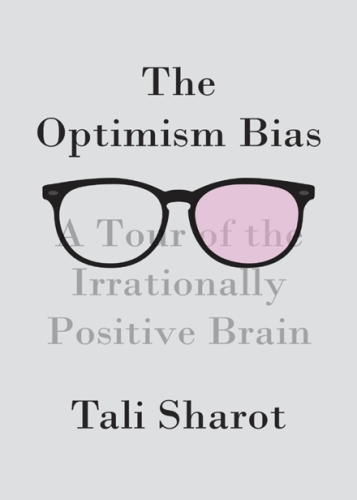
The Optimism Bias
A Tour of the Irrationally Positive Brain
کتاب های مرتبط
- اطلاعات
- نقد و بررسی
- دیدگاه کاربران
نقد و بررسی

May 1, 2011
Our mind deceives us by parking rose-colored glasses on our nose, writes neuroscientist Sharot, but only with the best of intentions.
In this lively, conversational book, the author puts on firm footing what many of us have sensed all along—that we are, by and large, a pretty optimistic bunch. Indeed, "optimism may be so essential to our survival that it is hardwired into our most complex organ, the brain." So prevalent are these optimistic tendencies that they compose a bias, a steady inclination to overestimate the likelihood of encountering more positive events in the future than negative ones. The optimism bias protects us from being stymied by the inevitable tribulations of everyday life, or to perceive that our options are limited in some manner; it helps us relax, improves our health and motivates us to act. Sharot is a friendly writer—her book brims with anecdotes and scientific studies that attest to optimism's gentling hand—though no empty smiley face: There is plenty in these pages about how we cope with root canals and chemotherapy, disappointment and dread. Sharot presents this evolutionary scenario: "an ability to imagine the future had to develop side by side with positive biases. The knowledge of death had to emerge at the same time as its irrational denial...It is this coupling—conscious prospection and optimism—that underlies the extraordinary achievements of the human species." Otherwise, considering the future would be paralyzing. The author circulates through much of the optimism/pessimism map, touching down on the importance of control, relativity and anticipation. What is most stunning, however, are the ways in which optimism not only evokes new behavior in the individual (optimistic heart-attack victim modeling healthy new behavior), but helps deliver the irrationally expected goods (Joe Namath guaranteeing victory in Super Bowl III).
A well-told, heartening report from neuroscience's front lines.
(COPYRIGHT (2011) KIRKUS REVIEWS/NIELSEN BUSINESS MEDIA, INC. ALL RIGHTS RESERVED.)

June 1, 2011
Why is it that many Americans swear to the veracity of their memories of 9/11, unaware that those memories are riddled with inaccuracies? In investigating that question, Sharot found herself exploring the much more general and pervasive phenomenon of groundless mental confidence. Whether defying statistical odds in (re)marriage, endorsing a recklessly bold coach's prediction of victory, or clinging to hope in the face of a grim cancer diagnosis, humans manifest optimism that resists rational explanation. Yet from the latest neurological research, Sharot adduces evidence that such irrationality actually improves job performance and enhances well-being. Indeed, further probing into the dynamics of optimism identifies the capacity to imagine a promising future as a characteristic unique to Homo sapiens. This is a capacity laced with risks, however, as Sharot shows by examining the fates of optimists who can no longer resist reality-defying fantasies. Still, most readers will turn the last page not only buoyed by hope but also aware of the sources and benefits of that hope.(Reprinted with permission of Booklist, copyright 2011, American Library Association.)

























دیدگاه کاربران